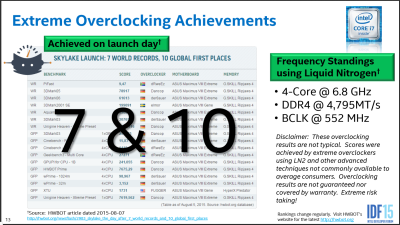IDF'15 Overclocking with Dan Ragland (Intel), Nick Shih (ASRock), and Colin Brix (Corsair)

The Intel Developer Forum 2015 San Francisco is underway and we're excited! As you know Intel is committed to overclocking or at least claims to be. During a technical session at IDF'15 titled "RPCS001 — Overclocking 6th Generation Intel® Core™ Processors!", Intel dove deeper into Skylake and Haswell-E overclocking challenges.
You can find the PDF at the IDF'15 website and for your convenience we've also uploaded it to Slideshare.net so you can embed it if you want.
A technical seminar is used to detail technical aspects of a specific use-case for Intel products. In this particular case, overclocking. The technical session detailed primarily Skylake overclocking features such as unlocked BCLK frequency, unlocked processor ratios, unlocked memory ratio, unlocked processor graphics ratio, and unlocked voltage controls. The biggest change with Skylake compared to Haswell is the seamless BCLK frequency overclocking in increments of 1 MHz. Intel's PCH solution allows up to 250 MHz, but custom design implementations by motherboard vendors will allow for much higher frequencies. For example, dRweEz already achieved 552 MHz. Also note that PCIe has a dedicated reference clock unlinked to the BCLK frequency, so using a low base clock frequency will not affect the PCIe performance.
As for HWBOT, we're mentioned twice. Firstly, there's some love for the overclockers who achieved the massive 7 World Records and 10 Global First Places during the first hours after Skylake launched officially. Also Intel announced XTU version 6.0 with the widely used HWBOT benchmark integration. You can download the latest version HERE.
In terms of commitment, Intel is certainly trying. But critical voices have spoken out already. If Intel were to truly commit to overclocking why is the thermal interface so poor? Moreover, the key point of having a wide range of BCLK frequency to play with historically is the benefit it gives to overclocking cheaper (read: sub USD $250) processors. For now Intel is committed to provide the high-spending customer based with overclocking products, but it seems to forget that the overclocking spirit rose the highest in the days where students and other people on a budget were about to tweak, tune, and fiddle their way to higher performance.





请登录或注册后才能评论